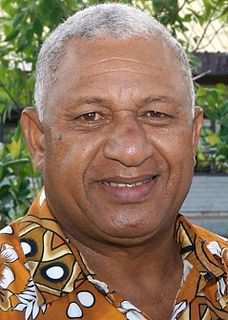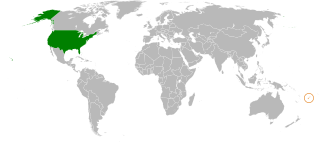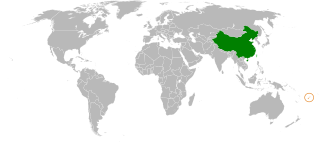
Laisenia Qarase is a Fijian political figure. He served as the sixth Prime Minister of Fiji from 2000 to 2006. After the military quashed the coup that led to the removal of Mahendra Chaudhry, Qarase joined the Interim Military Government as a financial adviser on 9 June 2000, until his appointment as Prime Minister on 4 July. He won two parliamentary elections, but a military coup removed him from power on 5 December 2006. He was later imprisoned on corruption charges brought by the Military-backed regime.

The Prime Minister of the Republic of Fiji is the head of government of Fiji. The Prime Minister is appointed by the President under the terms of the 2013 Constitution of Fiji.

Sitiveni Ligamamada Rabuka, OBE, MSD, OStJ, is best known as the instigator of two military coups that shook Fiji in 1987. He was later democratically elected as Prime Minister of Fiji, serving from 1992 to 1999. He went on to serve as Chairman of the Great Council of Chiefs, and later served as Chairman of the Cakaudrove Provincial Council from 2001 to 2008. He was elected to this position on 24 May 2001 and re-elected for another three-year term on 13 April 2005. On 24 June 2016, Rabuka was elected as leader of the Social Democratic Liberal Party, succeeding Leader of the Opposition Ro Teimumu Kepa, who publicly disapproved of Rabuka's nomination to replace her. On 26 November 2018, Rabuka was appointed as the leader of the Opposition to Parliament, following the 2018 election defeat. Rabuka was the only nomination for the position and his nomination was moved by Ro Teimumu Kepa and seconded by Biman Prasad.
Ratu Tevita Momoedonu is a Fijian chief and has served as the fifth Prime Minister of Fiji twice – each time extremely briefly. Both appointments were to get around constitutional technicalities; his first term of office – on 27 May 2000 lasted only a few minutes. His second term – from 14 to 16 March 2001 was for two days. He subsequently served his country as Ambassador to Japan. Using his chiefly title of "Taukei Sawaieke", he later led pushes for the Yasana of Ba to secede from the Burebasaga and Kubuna Confederacies to form their own fourth confederacy under the Tui Vuda, Ratu Josefa Iloilo, who died in 2011.

The Fiji coup of 2000 was a complicated affair involving a civilian coup d'état by hardline i-Taukei nationalists against the elected government of a Fijian of Indian Descent Prime Minister, Mahendra Chaudhry, on 19 May 2000, the attempt by President Ratu Sir Kamisese Mara to assert executive authority on 27 May, and his own resignation, possibly forced, on 29 May. An interim government headed by Commodore Frank Bainimarama was set up, and handed power over to an interim administration headed by Ratu Josefa Iloilo, as President, on 13 July.
Since attaining independence from the United Kingdom on 10 October 1970, Fijian history has been marked by exponential economic growth up to 1987, followed by relative stagnation, caused to a large extent by political instability following two military coups in 1987 and a civilian putsch in 2000. This was followed by another military coup in 2006. Rivalry between indigenous Fijians and Indo-Fijians, rather than ideological differences, have been the most visible cleavage of Fijian politics.
Poseci Waqalevu Bune is a former Fijian politician, who has served as Deputy Leader of the Fiji Labour Party (FLP). From June to December 2006, he served as Minister for the Environment, one of nine FLP ministers, in the multiparty Cabinet of Prime Minister Laisenia Qarase. His ministerial career was terminated by the coup d'état that deposed the government on 5 December 2006, but on January 8, 2007, he was appointed as Minister for Public Service and Public Service Reform in the interim Cabinet of Commodore Frank Bainimarama.
Petero Mataca born at Cawaci, on Ovalau Island, served as the Roman Catholic archbishop of Suva, Fiji until his resignation in 2012.

The Constitution of Fiji requires general elections for the House of Representatives to be held at least once every five years. The last election before Fiji's 2014 election was held on 6–13 May 2006. Acting President Ratu Joni Madraiwiwi issued a proclamation on 2 March, effective from 27 March, dissolving Parliament. The previous parliamentary term had been due to expire on 1 October 2006.
Lekh Ram Vayeshnoi, is a Fijian politician of Indian descent. He was one of the youngest members to be elected into Parliament in 1992. He has represented the Nadroga Indian Communal Constituency, which he won for the Fiji Labour Party (FLP) in the parliamentary elections of 1992, 1994, 1999, 2001, and 2006. After the 1999 election he was appointed Assistant Minister in Prime Minister's Office. He was appointed Minister for Youth and Sports and Employment Opportunities in the interim administration that followed the military coup that took place on 5 December 2006. He was born to a family of Rajasthani descent.

General elections were held in Fiji on 17 September 2014, to select the 50 members of the Fijian parliament.
Peter Ridgway is an Australian prosecutor and a former Deputy Director of Prosecutions in Fiji.

Fiji – United States relations have improved significantly since Fiji's elections in September 2014, which restored a democratically elected government to Fiji for the first time since 2006. The United States had opposed Fiji's unelected government, which came to power through a military coup in December 2006.

The Republic of the Fiji Islands was the first Pacific Island country to establish diplomatic relations with the People's Republic of China, in 1975. China established an embassy in Fiji in 1976, and Fiji opened its embassy in China in 2001. Fiji's current ambassador to China is Commodore Esala Teleni, who in late 2010 replaced Sir James Ah Koy, who had served since 2007. China's ambassador to Fiji is Huang Yong.











